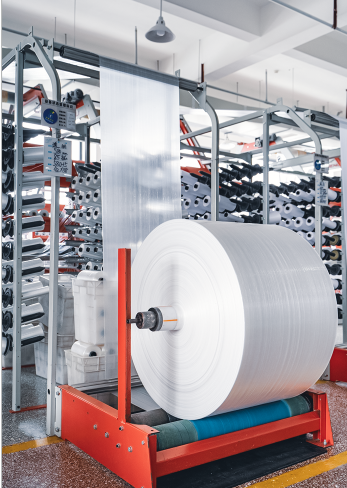Bei der Abfallbewirtschaftung auf Baustellen und in der Industrie geht es nicht nur um die Beseitigung von Abfällen – es geht auch darum, Kosten zu senken, Umweltschäden zu reduzieren und die Effizienz zu steigern. Eine intelligente, skalierbare Lösung? Das Recycling von Bauschuttsäcken. Diese robusten Behälter – auch FIBCs oder Schüttgutsäcke genannt – sind nicht nur robust und vielseitig, sondern können auch wiederverwendet und recycelt werden, um einen nachhaltigeren und rentableren Betrieb zu unterstützen.
In diesem Artikel erklären wir Ihnen, was Bau-Big Bags genau sind, warum sie wichtig sind und wie Branchen wie Ihre ihre Lebensdauer maximieren und gleichzeitig Nachhaltigkeitsziele erreichen können. Sie erfahren außerdem, wie ihr Recycling zu einer Kreislaufwirtschaft beiträgt und wie Unternehmen wie die XIFA Group mit leistungsstarken, recycelbaren Verpackungslösungen eine Vorreiterrolle einnehmen.

Bau-Schüttsäcke (FIBCs) sind große, gewebte Säcke aus Polypropylen (PP) für den Transport und die Lagerung von Schüttgütern. Im Bau- und Industriebereich sind sie für den Umgang mit Sand, Kies, Zement, Abbruchabfällen und anderen Schwerlastmaterialien unverzichtbar.
Auch bekannt als Supersäcke, Big Bags oder Schüttgutsäcke mit offener OberseiteDiese Behälter werden entweder in U-, Vier- oder Rundbauweise oder mit Leitblechen gefertigt. Dank ihrer gewebten Struktur sind sie ideal für die mechanische Handhabung mit Kränen oder Gabelstaplern – eine zusätzliche Verpackung ist nicht erforderlich.
Recycling von Bau-Großsäcken reduziert Abfall, senkt Kosten und unterstützt die Nachhaltigkeitsziele Ihres Unternehmens. So geht's:
Bau- und Industriesektoren produzieren jedes Jahr Millionen Tonnen Abfall, ein Großteil davon aus Kunststoff. Polypropylen-Großsäcke belasten die Umwelt zusätzlich, wenn sie deponiert oder verbrannt werden. Da PP jedoch ein Kunststoff #5 (weitgehend recycelbar) ist, können diese Säcke zu neuen Produkten wie Gartenmöbeln, Kunststoffholz, Mülltonnen und weiteren Großsäcken recycelt werden.
Durch das Recycling von Schüttgutsäcken können folgende Kosten reduziert werden:
Durch die Wiederverwendung und das Recycling von FIBCs reduzieren Unternehmen ihren Verbrauch an Neukunststoffen und erfüllen gleichzeitig gesetzliche und ESG-Ziele. Darüber hinaus verbessert die Aufrechterhaltung eines nachhaltigen Abfallstroms den Ruf der Marke in einem zunehmend umweltbewussten Markt.
Effizientes Recycling beginnt vor Ort. Unsachgemäße Handhabung führt zu Verunreinigungen, die die Recyclingfähigkeit der Säcke verringern.
Stellen Sie sicher, dass die Beutel vollständig von Produktresten, insbesondere gefährlichen oder chemischen Abfällen, entleert sind.
Feuchtigkeit kann die Fasern beschädigen und sie für das Kunststoffrecycling ungeeignet machen. Lagern Sie die Beutel möglichst an einem trockenen, schattigen Ort.
Trennen Sie wiederverwendbare Taschen von stark beschädigten. Kennzeichnen Sie die Taschen deutlich nach Verwendungszweck: recycelbar, gefährlich oder allgemeiner Abfall.
Komprimieren und stapeln Sie die Säcke flach oder binden Sie sie zu Ballen zusammen. Dies minimiert den Platzbedarf und verbessert die Aufnahmeeffizienz.
Stellen Sie sicher, dass Ihr Team weiß, wie die Säcke zu handhaben, zu beschriften und für das Recycling vorzubereiten sind. Dieser kleine Schritt vermeidet Verunreinigungen und schützt den Wert des Recyclings.
Nach der Abholung werden die offenen Schüttgutsäcke einem speziellen Recyclingprozess unterzogen, um sie in wiederverwendbare Materialien umzuwandeln. So funktioniert es:
Nachdem die Säcke sortiert und an eine Recyclinganlage geliefert wurden, werden sie zur Vorbereitung der weiteren Verarbeitung in kleine Flocken zerkleinert.
Die Flocken werden gewaschen, um Staub, Tinte und Produktrückstände zu entfernen. Sauberes Material gewährleistet eine höhere Qualität der Endprodukte.
Sauberes Polypropylen wird geschmolzen und zu Pellets extrudiert, die als Rohstoff für neue PP-Produkte dienen, darunter auch Recyclingbeutel aus Kunststoffgewebe.
Einrichtungen, die das Recycling von Big Bags mit offener Oberseite durchführen, können auch UV-beständige Behandlungen oder Farbsortierung anwenden, um die Qualität während der Wiederverwendung zu erhalten.
In ganz Europa und Nordamerika wird bei großen Bau- und Infrastrukturprojekten das Recycling von Bausäcken als Teil nachhaltiger Baustellenstrategien eingeführt. Beispiele:
Diese Erfolgsgeschichten zeigen, wie das Recycling von Schüttgutsäcken sowohl die Umweltbelastung als auch die Betriebskosten senkt.
Das Recycling von Bausäcken ist eine langfristige Lösung zur Bewältigung des wachsenden Abfallproblems in der Baubranche. Diese Säcke bieten eine einzigartige Kombination aus Stabilität, Wiederverwendbarkeit und Recyclingfähigkeit, die nur wenige Verpackungsprodukte bieten. Bei richtiger Handhabung tragen sie zu Kosteneinsparungen, Umweltschutzzielen und einer effizienten Baustellenlogistik bei.
Als Hersteller, der sich dieser Mission voll und ganz verpflichtet fühlt, XIFA-Gruppe produziert hochfeste, individuell anpassbare FIBC-Big Bags, die den Anforderungen der modernen Industrie gerecht werden. Unsere gewebten Polypropylen-Säcke sind langlebig und recycelbar und helfen Kunden, die Umweltbelastung zu reduzieren und gleichzeitig die Leistung zu optimieren.
Wir von der XIFA Group sind stolz darauf, die Zukunft nachhaltiger Verpackungen mit leistungsstarken, recycelbaren Großgebinden zu unterstützen. Sind Sie bereit, Ihre Abfallmanagementstrategie zu verbessern? Kontaktieren Sie uns noch heute oder stöbern Sie in unserem vollständiges Produktt-Bereich online.
Gewebtes Polypropylen (Kunststoff #5), bekannt für seine Festigkeit und Recyclingfähigkeit.
Nein. Beutel müssen vor dem Recycling geleert und gereinigt werden, um eine Verunreinigung zu vermeiden.
Einige FIBCs sind für den einmaligen Gebrauch bestimmt, während Mehrwegbeutel, sofern unbeschädigt, 5–10 Mal wiederverwendet werden können.
Wenden Sie sich an lokale Recyclinganlagen oder externe FIBC-Recycler. Nicht alle kommunalen Programme akzeptieren Industriesäcke.




